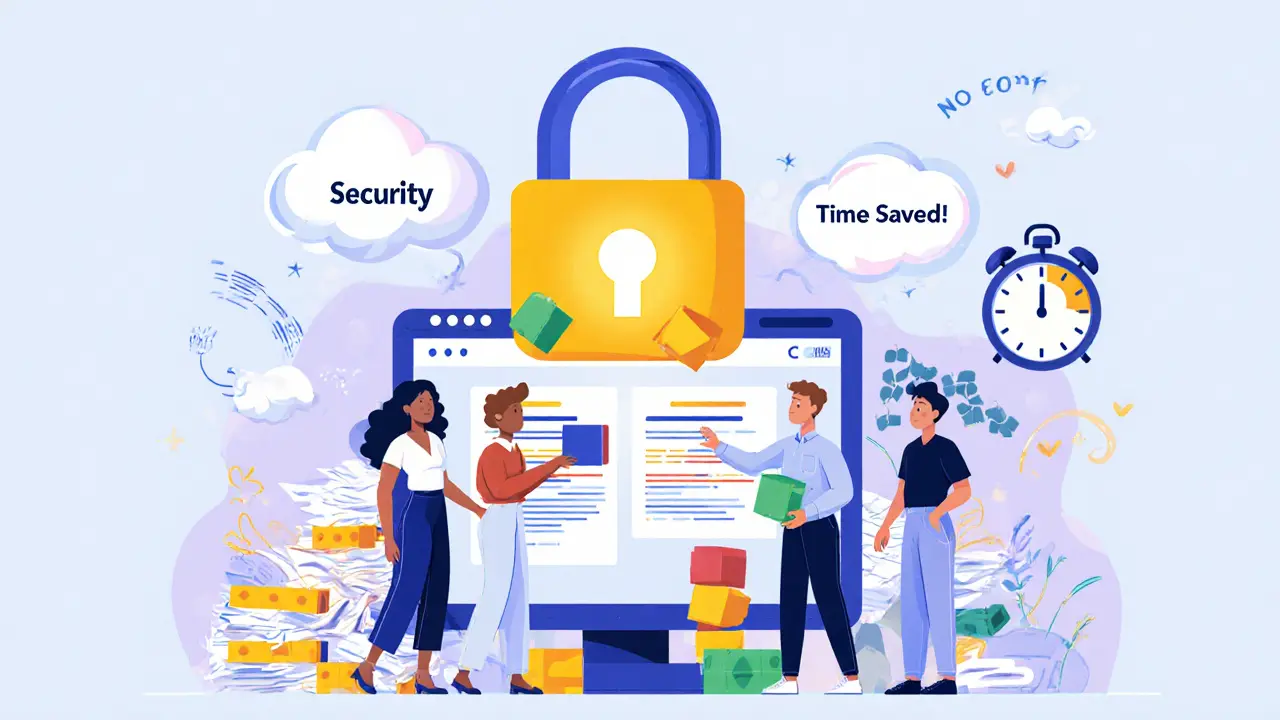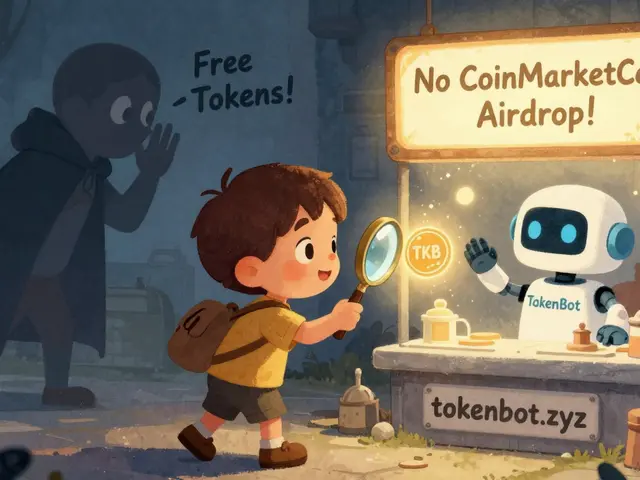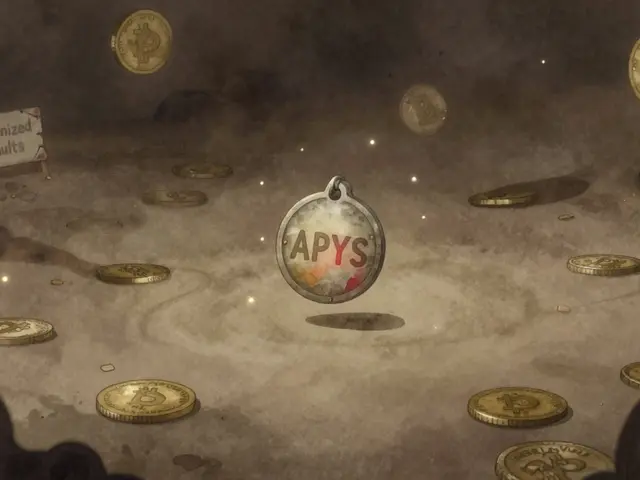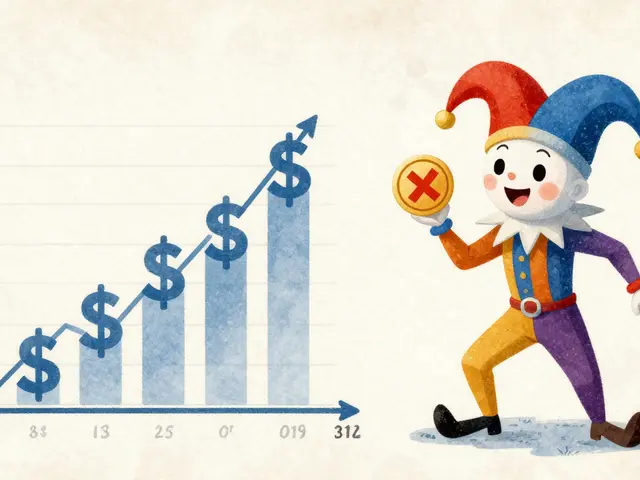BaaS Cost Calculator
Estimate Your BaaS Costs
How It Works
Base Cost
$50/month + $0.05 per transaction + $10 per user
Industry Adjustments
Banking/Healthcare: +15% due to compliance requirements
Government: +20% for security protocols
Advanced Features
+ $20/month for custom smart contracts
Estimated Monthly Cost
Blockchain-as-a-Service (BaaS) lets companies use blockchain technology without building it from scratch. You don’t need a team of blockchain engineers, expensive servers, or months of setup. Instead, you rent the infrastructure-just like renting cloud storage or email tools. It’s blockchain, but handled by someone else so you can focus on your business.
How BaaS Works
Think of BaaS like a web hosting service-but for blockchain apps. Instead of buying and maintaining your own servers, you sign up with a provider like Microsoft Azure, Amazon Web Services, or IBM Cloud. They handle everything: setting up blockchain nodes, keeping the network running, securing data, and updating software. You get a dashboard, pre-built templates, and APIs to connect your apps. You still control what your blockchain does. Maybe you want to track product shipments, verify employee IDs, or record payments. You design the rules-called smart contracts-and the BaaS platform runs them automatically. All you’re paying for is the computing power and storage you use, usually on a monthly subscription.Why Companies Use BaaS
Most businesses don’t care how blockchain works under the hood. They care about results: faster audits, fewer fraud cases, clearer records. BaaS delivers that without the headache.- Lower costs: No need to hire specialists or buy hardware. A small business can start with under $500 a month.
- Faster setup: Deploy a working blockchain network in days, not months.
- Automatic updates: Providers patch security flaws and upgrade protocols without you lifting a finger.
- Scalable: Need to handle 10 transactions a day? Or 10,000? The platform adjusts automatically.
- Enterprise-grade security: Providers use military-grade encryption, multi-factor authentication, and audit logs.
For example, a food distributor in Perth might use BaaS to track where each batch of coffee beans came from. If there’s a contamination alert, they can trace every shipment in seconds-not days. That’s real value.
What BaaS Doesn’t Do
BaaS isn’t magic. It doesn’t solve every problem, and it comes with trade-offs. The biggest one? Centralization. Blockchain was built to remove middlemen. But with BaaS, you’re trusting a single company-like AWS or Microsoft-to run your network. That means they have control over who joins, how nodes are managed, and even when to update the rules. Some companies avoid BaaS because of this. If your goal is a fully decentralized, public blockchain like Bitcoin, then BaaS isn’t the right tool. But if you’re running a private network for your suppliers, partners, or internal teams, BaaS works perfectly. Also, you’re locked in. Switching providers later can be messy. Your smart contracts, data formats, and APIs may not transfer easily. That’s why choosing the right BaaS platform matters.Who Uses BaaS Today?
BaaS isn’t just for tech startups. Real businesses across industries are using it right now:- Supply chains: Walmart and Maersk use BaaS to track shipping containers and food safety records.
- Banking: JPMorgan’s Onyx network runs on BaaS to settle payments between banks in minutes.
- Healthcare: Hospitals use it to securely share patient records across clinics without risking data leaks.
- Government: Estonia uses BaaS for digital identity and voting systems.
- Manufacturing: Companies track parts from suppliers to assembly lines to prevent counterfeits.
In Australia, small logistics firms are starting to use BaaS to prove product authenticity to Asian buyers. No more fake certificates. No more delays from manual checks.
How to Get Started
If you’re thinking about BaaS, here’s how to begin:- Define your problem. What do you want to track? Who needs to see it? Is it about transparency, speed, or security?
- Choose a provider. AWS Managed Blockchain, Azure Blockchain Workbench, and IBM Blockchain Platform are the top three. All offer free trials.
- Start small. Build one smart contract for one process-like approving purchase orders.
- Test with partners. Get your suppliers or clients to join the network. Blockchain only works if others are on it.
- Scale gradually. Add more processes, more users, more data.
You don’t need to be a coder. Most BaaS platforms let you build smart contracts using drag-and-drop tools or simple templates.

What to Watch Out For
Not all BaaS providers are equal. Here’s what to check before signing up:- Which blockchain engine? Some use Ethereum, others Hyperledger Fabric. Make sure it fits your needs.
- Where’s your data stored? If you’re in Australia, you might need data to stay in-country for legal reasons.
- What’s the exit plan? Can you export your data and smart contracts if you leave?
- Support and training? Do they offer help for non-technical staff?
Don’t be fooled by marketing hype. BaaS isn’t about being "blockchain-powered." It’s about solving real problems-faster, cheaper, and more transparently.
The Bottom Line
Blockchain-as-a-Service turns a once-complex, expensive technology into something any business can use. It’s not for everyone-but if you’re tired of manual record-keeping, slow audits, or fraud risks, it’s worth testing. You’re not buying a blockchain. You’re buying time, clarity, and trust.Is Blockchain-as-a-Service the same as Bitcoin?
No. Bitcoin is a public, decentralized cryptocurrency network anyone can join. BaaS is a private, managed service used by businesses to run their own private blockchains. BaaS might use the same underlying tech as Bitcoin, but it’s designed for companies-not for trading or mining.
Can small businesses afford BaaS?
Yes. Many BaaS providers offer pay-as-you-go plans starting under $100 per month. For a small business tracking 100 shipments a week, the cost is often less than hiring a part-time admin to handle paperwork. The real savings come from cutting errors, delays, and fraud.
Do I need to know how to code to use BaaS?
Not necessarily. Most BaaS platforms offer visual tools to build smart contracts without writing code. You can set conditions like "If shipment arrives after 5 days, notify manager" using dropdown menus and checkboxes. For advanced needs, developers can still write custom code-but it’s optional.
Is BaaS secure?
Yes-often more secure than traditional databases. BaaS providers use encryption, access controls, and regular audits. Since data is stored across multiple nodes, it’s harder to hack or alter. But security depends on how you set it up. Poor access rules or weak passwords can still cause leaks.
What’s the difference between BaaS and cloud storage like Dropbox?
Dropbox stores files. BaaS records transactions in a tamper-proof, chronological ledger. With Dropbox, you can delete or edit files. With BaaS, once a record is added, it can’t be changed-only new entries can be added. That’s why it’s used for audits, contracts, and supply chains-not just file sharing.
Can I switch BaaS providers later?
It’s possible, but not easy. Your smart contracts and data formats are tied to the platform’s architecture. Some providers offer export tools, but you’ll likely need to rebuild parts of your system. That’s why it’s smart to pick a provider with open standards and good documentation from the start.
Does BaaS work with existing software?
Yes. Most BaaS platforms offer APIs that connect to ERP systems like SAP, accounting tools like QuickBooks, or inventory software. You don’t need to replace your whole tech stack-just add blockchain as a secure layer on top.







Astor Digital
November 15, 2025 AT 13:27Aayansh Singh
November 16, 2025 AT 23:06Rebecca Amy
November 17, 2025 AT 01:42Darren Jones
November 18, 2025 AT 22:58Kathleen Bauer
November 19, 2025 AT 04:32Laura Lauwereins
November 19, 2025 AT 14:31Gaurang Kulkarni
November 19, 2025 AT 22:51Nidhi Gaur
November 21, 2025 AT 13:54Usnish Guha
November 21, 2025 AT 15:39satish gedam
November 22, 2025 AT 09:54rahul saha
November 23, 2025 AT 21:14Jerrad Kyle
November 25, 2025 AT 10:59Usama Ahmad
November 26, 2025 AT 02:45Nathan Ross
November 26, 2025 AT 09:20garrett goggin
November 27, 2025 AT 09:02Bill Henry
November 27, 2025 AT 11:30Jess Zafarris
November 27, 2025 AT 21:36jesani amit
November 28, 2025 AT 12:31Peter Rossiter
November 29, 2025 AT 07:59Mike Gransky
November 30, 2025 AT 23:10Ella Davies
December 1, 2025 AT 14:02Henry Lu
December 1, 2025 AT 22:26nikhil .m445
December 2, 2025 AT 11:52Rick Mendoza
December 2, 2025 AT 22:42Darren Jones
December 3, 2025 AT 02:53Astor Digital
December 4, 2025 AT 18:11Ella Davies
December 5, 2025 AT 01:04